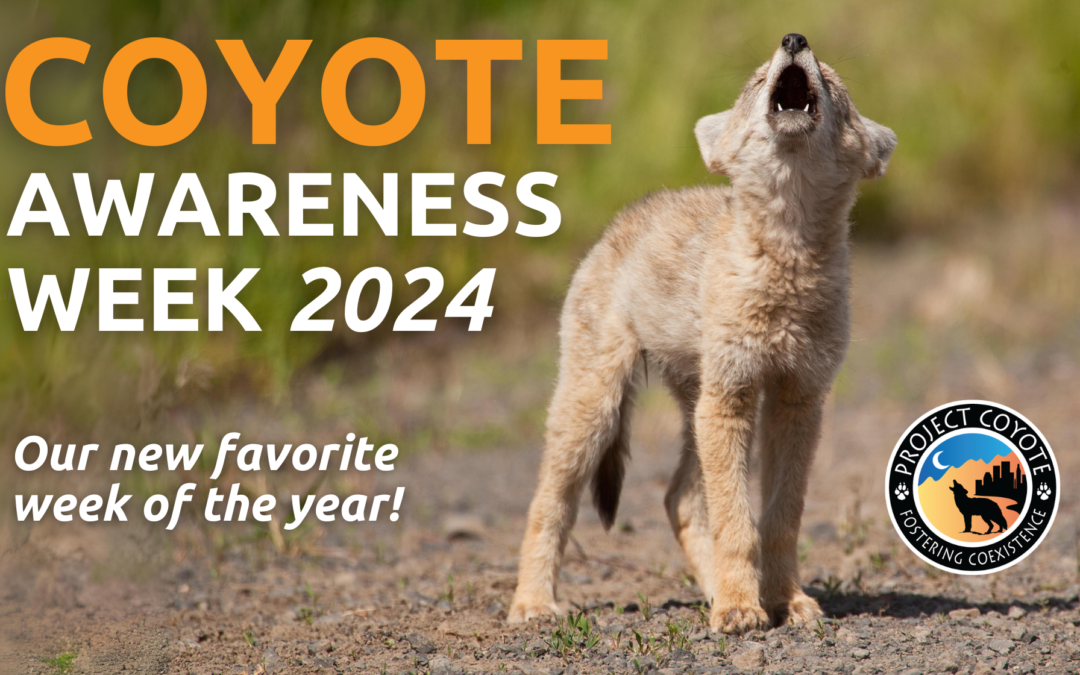March 17, 2024
Media Contacts: info@projectcoyote.org, 415.945.3232
Project Coyote Launches First Annual Coyote Awareness Week to Celebrate America’s Song Dogs
March 17-23, 2024
LARKSPUR, CA—Project Coyote is thrilled to launch the first annual Coyote Awareness Week. This new holiday starts on March 17th and leads up to National Coyote Day on March 23rd, and intends to raise awareness about the intense persecution and misunderstanding coyotes face and the importance of compassionate coexistence.
Why We’re Raising Awareness About Coyotes
Coyotes represent the pinnacle of unethical and unscientific wildlife “management” in the U.S. Increased awareness of and appreciation for coyotes are critically needed to reform outdated wildlife policies and end the unjust and unscientific persecution of coyotes deeply rooted in American culture ever since European colonization.
Predator extermination campaigns in the 1800s–mid 1900s nearly wiped wolves, mountain lions, and bears off the map. But when the focus turned to coyotes, they responded to this persecution with resilience and adaptability, tripling their range in the last century and filling vacant niches left where wolves were extirpated. Rather than celebrating their resilience to adapt to a human dominated world and the important roles they play in our urban and rural communities, our society has often labeled the coyote as a “pest” or a threat to human communities.
Coyote’s ability to adjust to changing conditions and diverse environments, along with their resiliency to survive and thrive in the face of relentless persecution, has left them vulnerable to insufficient legal protections. In almost every region of the United States, coyotes are legally allowed to be killed, sometimes incentivized through bounties, in unlimited numbers 365 days of the year, using almost any means, including killing contests, trapping, poisoning, hounding, and unregulated recreational killing.
“If we can change hearts and minds about coyotes, the world will be a more compassionate place for all wildlife. That is why coyotes are our flagship species at Project Coyote. And that is why we launched the first annual Coyote Awareness Week,” said Camilla Fox, Project Coyote Founder & Executive Director.
The inadequate protections for coyotes lead to at least 500,000 killed each year, of which over 55,000 are killed annually by the USDA’s Wildlife Services agency at taxpayer expense (as of 2022). Accurate numbers do not exist for how many coyotes are killed through “sport” or wildlife killing contests, because state agencies often do not track or monitor the killing of coyotes, and this number is likely a very low estimate. Even with this underestimate, it translates to: 41,666 coyotes killed every month, 9,615 coyotes killed every week, 1,370 coyotes killed every day, 57 coyotes killed every hour, and 1 coyote killed every minute.
Importance of Coexisting in our Multispecies Communities
It is vital to foster coexistence with coyotes in both urban and rural communities. Coyotes play critical roles in our multispecies communities including regulating disease transmission by managing rodent populations and culling sick animals, keeping our communities clean by scavenging carrion, and limiting mesocarnivore populations (e.g. raccoons, skunks and foxes) thereby increasing bird diversity and abundance.
Coexisting with coyotes and other wild carnivores can reduce conflict. Decades of scientific literature demonstrate the ineffectiveness of lethal “management” for reducing conflict and for reducing population size. Indiscriminate killing disrupts social systems and subsequently encourages more breeding and migration, which can lead to increases in livestock conflict. Additionally, higher survivability of coyote pups can follow brief population declines due to a temporary increase in available prey, allowing coyote populations to quickly rebound and even increase in number. Despite this data, the default reaction to coyote sightings is too often fear mongering that leads to lethal management. To combat this, citizens across the country can empower their fellow community members to instead interpret coyote behavior, reduce attractants (like unsecure garbage, compost, and pet food), and humanely haze bold coyotes.
It is well past time to replace lethal “management” with coexistence. Coyotes, like everyone, belong and have a right to exist. Coyotes are sentient, family oriented beings who deserve protection from unscientific and unethical persecution.
Celebrating America’s Song Dogs During Coyote Awareness Week:
Each day of Coyote Awareness Week, Project Coyote will share coyote content on social media. We encourage supporters to follow us (Facebook, X/Twitter, LinkedIn, Instagram, YouTube, TikTok), engage with or resharing our posts, and use the #CoyoteAwarenessWeek hashtag to broaden the impact and reach of Coyote Awareness Week.
We also encourage supporters to celebrate the coyote by learning more about this unique species. If you enjoy documentaries, watch the 2023 film American Bolshevik, which details the history of the most hunted animal in America (the coyote) and features Project Coyote’s Founder & Executive Director, Camilla Fox, New Hampshire Representative & Wild Canid Ecologist, Chris Schadler, and Ambassador, Dan Flores. If you enjoy reading, check out Coyote America, New York Times best-seller, written by Project Coyote Ambassador Dan Flores, and Coyotes in Our Midst, co-authored by Camilla Fox and available to download free of charge.
Finally, we encourage supporters to promote coyote coexistence in their community this week- and every week. It’s a community wide effort to keep coyotes wild and safe from unintended habituation.
“Coyote power: surviving by one’s intelligence and wits when others cannot; embracing existence in a mad, dancing, laughing, sympathetic expression of pure joy at evading the grimmest of fates; exulting in sheer aliveness; recognizing our shortcomings with rueful chagrin.”
~ Dan Flores, author, Coyote America and Project Coyote Ambassador
##

